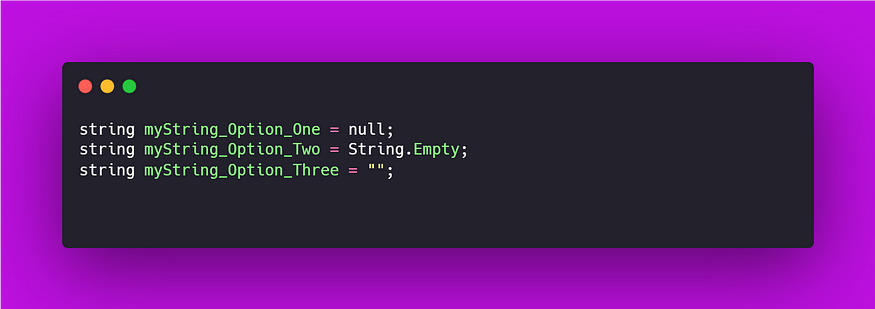In C# programming, effective handling of data is a pivotal aspect that significantly influences the robustness and reliability of software applications. When it comes to managing empty or null values within strings, developers often grapple with choosing the appropriate approach among three commonly used alternatives: C# null, String.Empty, and double quotation marks (“”).

Each option has its distinct characteristics and use cases, and understanding the difference between them is crucial for crafting efficient and error-resistant code. This exploration drives into the differences among C# null, String.Empty, and double quotation marks, shedding light on when and how each should be employed to optimize code clarity and functionality. By navigating this comparison, developers can enhance their proficiency in C# and make informed decisions to elevate the quality of their software solutions.

In C#, null, String.Empty, and an empty string ("") are all different concepts, and they serve different purposes.
null:
- Represents a null reference. It indicates that a variable does not reference any object.
- Used for reference types (classes, interfaces, delegates, etc.) to signify the absence of an object.
For example:
string myString_Option_One = null;
String.Empty
- Represents an empty string, which is a string with zero characters.
- Specifically provided as a constant field in the
Stringclass to represent an empty string without creating a new instance. - Useful when you want to explicitly indicate an empty string without using the literal
"".
For example:
string myString_Option_Two = String.Empty;
Double Quotation Marks “” :
- Represents an empty string created using the string literal syntax.
- This is the most common way to create an empty string.
For example:
string myString_Option_Three = "";
In summary:
- Use
nullwhen you want to indicate the absence of an object reference. - Use
String.Emptywhen you want to represent an empty string in a clear and readable way without creating a new instance of a string. - Use
""when you want to represent an empty string using the string literal syntax.
It’s important to choose the one that best fits the context and provides clarity in your code. In many cases, the choice between String.Empty and "" is a matter of personal or team preference.
Inthe dynamic landscape of C# programming, the choice between C# null, String.Empty, and double quotation marks (“”) is not merely a matter of syntax but a strategic decision that significantly impacts code readability, maintainability, and performance. As we conclude this exploration, it becomes evident that each approach serves distinct purposes.
C# null is a representation of the absence of a value and is often used when the absence of a value holds a specific meaning in the logic of the program. String.Empty, on the other hand, is a pre-defined constant that explicitly signifies an empty string, offering a clear and concise way to represent an absence of textual content. Double quotation marks (“”) are commonly employed to initialize an empty string and can be seen as a more lightweight alternative to String.Empty.
Understanding the differences between these options is crucial for writing code that not only functions correctly but is also easy to comprehend and maintain. Depending on the context, one choice may be more suitable than the others. Developers should consider the specific requirements of their applications, the semantics they wish to convey, and the potential impact on performance.
In the end, mastering the differences of C# null, String.Empty, and double quotation marks empower developers to make informed decisions, contributing to the creation of robust and efficient software solutions. As programming paradigms evolve, the ability to choose the right tool for the job remains an essential skill, ensuring that codebases are not only functional but also adaptable to the ever-changing landscape of software development.
